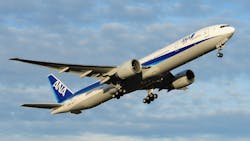Japan's ANA to Buy Stake in Myanmar Airline
TOKYO - Japan's All Nippon Airways (ANA) said Tuesday it would acquire a 49% stake in a Myanmar airline, the latest foray into the rapidly-opening and potentially lucrative Southeast Asian market.
Foreign firms have piled into Myanmar since the installation of a nominally civilian government in 2011, eager to make the most of opportunities in a fast-changing country, but this is the first move on an airline.
"ANA Group will invest $25 million for AWA (Asian Wings Airways) as part of its stated strategy of expanding into new international markets," ANA Holdings - the parent of one of Japan's major airlines - said in a statement.
"As part of the investment, ANA will also work with AWA to improve its operational and on-time performance and support its expansion into markets outside Myanmar," the company said.
The Japanese airline also said it will employ larger aircraft and make the currently three-flights-per-week service daily between Tokyo's Narita and Yangon from the end of September.
"The acquisition of the stake in AWA represents the first investment in a Myanmar-based commercial carrier by a foreign airline," the statement said.
"ANA intends to capture an increasing share of the fast-growing Asian airline market and this investment in AWA will support that strategic goal," it added.
Asian Wings, based in the commercial hub of Yangon, flies to 13 cities in Myanmar. It will begin an international service this October.
Rising Demand in Southeast Asia
The Myanmar carrier is considered a mid-tier player in a domestic market packed with nine airlines, including the government-run Myanmar Airways.
With demand for travel in Japan expected to remain largely flat because of the greying, shrinking population, ANA is trying to capture rising demand in Southeast Asia.
In October, ANA restarted direct flights from Narita to Yangon after a 12-year hiatus, pointing to the rising number of business travelers and tourists headed to Myanmar.
Unlike many industrialized countries, Japan maintained trade ties and generous aid for Myanmar while it was ruled by a military junta, warning that taking a hard line could push it closer to China.
Tokyo has also gently pressed the country's leaders to listen to the voices of those in opposition and the international community.
Since the end of military rule in 2011, Myanmar has made visible efforts to open up to the rest of the world and has lured international business.
Japanese businesses in particular have been active in the country with strong backing from Tokyo, including the cancellation of billions of dollars of debt and numerous aid grants.
Harumi Ozawa, AFP
Copyright Agence France-Presse, 2013
About the Author
Agence France-Presse
Copyright Agence France-Presse, 2002-2025. AFP text, photos, graphics and logos shall not be reproduced, published, broadcast, rewritten for broadcast or publication or redistributed directly or indirectly in any medium. AFP shall not be held liable for any delays, inaccuracies, errors or omissions in any AFP content, or for any actions taken in consequence.
